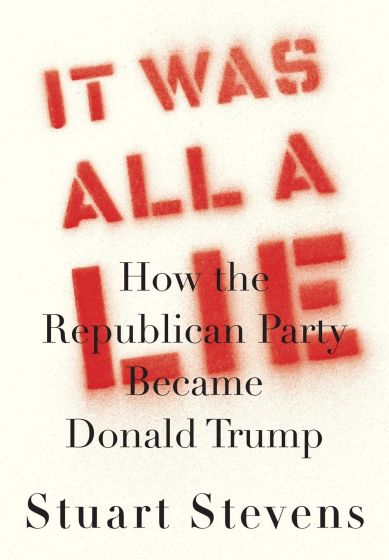

|
| De Amazon — TBR |
| IT WAS ALL A LIE How the Republican Party Became Donald Trump Stuart Stevens New York: Alfred A. Knopf, August 2020 |
Rating: 5.0 High |
|||
| ISBN-13 978-0-525-65845-0 | ||||
| ISBN 0-525-65845-9 | 237pp. | HC | $26.95 | |
The author is a Republican political consultant, like Rick Wilson, and a successful one. He shows us early on some of his successful campaigns — successful because he played the race card. But this is no boast. It is a confession of complicity in his party's devolution into a veritable cult which promotes and enables the candidates having the basest motives.
"As much as I'd love to go to bed at night reassuring myself that Donald Trump was some freak product of the system—a 'black swan,' as his ludicrously unqualified son-in-law says—I can't do it. I can't keep lying to myself to ward off the depressing reality that I have been lying to myself for decades. There is nothing strange or unexpected about Donald Trump. He is the logical conclusion of what the Republican Party became over the last fifty or so years, a natural product of the seeds of race, self-deception, and anger that became the essence of the Republican Party. Trump isn't an aberration of the Republican Party; he is the Republican Party in a purified form." – Page 4 |
Stevens then reprises the history of his party from the mid-twentieth century through Trump's ascension to power. Through that history, racism runs like an underground current, cloaked but always felt. He covers Reagan's speech at Neshoba, MS, where three civil rights workers were murdered by Klansmen. He covers Goldwater and Wallace and the Willie Horton ad. And he covers Trump.
"Thirty-seven years later, Donald Trump would stand in another state, Alabama, where civil rights was a life-and-death struggle, and attack NFL players protesting police brutality by taking a knee during the national anthem. "That's a total disrespect of our heritage. That's a total disrespect of everything that we stand for. Wouldn't you love to see one of these NFL owners, when somebody disrespects our flag, you'd say, 'Get that son of a bitch off the field right now. Out! He's fired.'" In a state where more than three hundred African Americans were lynched, many for the simple crime of trying to vote or helping others vote, referencing "our heritage" and calling black protesters sons of bitches in front of an overwhelmingly white audience was the perfect kind of racist pitch. It was heard clearly and undeniably as racist." – Page 21 |
Stevens provides a thoroughgoing analysis of how the Republican Party abandoned its principles; who are the principal figures in the process, from prominent thought leaders like William F. Buckley1 to obscure scholars like Myron Magnet;2 and what mechanisms they use to stay in control. He is less thorough about why this happened. But he does frankly state that it was due to the forces of fear and greed always operating in politics. And he is clear that there will be no redeeming the current crop of Republicans.
"Donald Trump has served a useful purpose by exposing the deep flaws of a major American political party. Like a heavy truck driven over a bridge on the edge of collapse, Trump has made it impossible to ignore the long-developing fault lines and failures of the Republican Party. A party rooted in decency and values does not embrace the vicious hate that Donald Trump peddles as patriotism. But the Republican Party did and does. This moment should signal a day of reckoning for the party and all who claim it as a political entity. Will it? I'm not hopeful. Better than most, I know the seductive lure of believing what you prefer to believe and ignoring the obvious truth. "What the Republican Party must realize is that it needs America more than America needs the party. And the America it needs is the one that is 320 million Americans and growing, a country of immigrants and less white every day: the real America, not the gauzy Shangri-La of suburban bliss that never existed. I'd like to say I believe the party I spent so many years fighting for could rise to that challenge. But that would be a lie, and there have been too many lies for too long." – Pages 201-2 |
The book is well written and reads quickly. There are some grammatical errors, but not an unusual number. It has a set of endnotes and a Bibliography of 195 entries, reflecting the number of books Mr. Stevens has read. Its main defect is the lack of an index; because of that, I won't rate it a keeper. But I give it top marks and consider it a must-read.

 To contact Chris Winter, send email to this address.
To contact Chris Winter, send email to this address.